経済教育ワークショップ「東京」:Economic Education Workship@Tokyo [Report]
経済教育ワークショップ「東京」:Economic Education Workship@Tokyo
日時:2009年3月14日 13:00-17:00:Date: March 14, 2009
場所:日大経済学部:Place: Nihon University, Economics Department
参加者:中学校社会科教員を中心に約20名(含発表者)
Participants: About 20 middle school teachers & specialists
後援:(財)経済広報センター、東京都千代田区教育委員会
Sponsors: Keizai Koho Center, Chiyoda-ku Kyoiku Iinkai
プログラム: Program:
13:05-13:10 挨拶:新井明氏(Opening Address by Mr. A. Arai):写真左
13:10-14:20 講演:篠原総一氏(Main Lecture by Mr. S. Shinohara):写真右
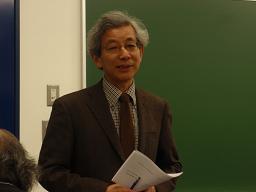
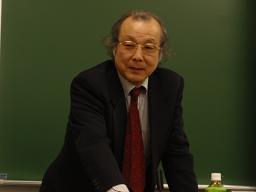
14:30-15:40 教材提案:三枝利多氏(Proposal by Mr. T. Saegusa):写真左
司会とコメント役の加藤一誠氏(Moderator & Discussant, Mr. I. Kato):写真右
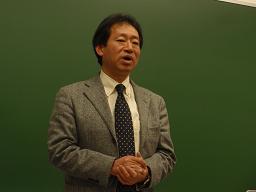
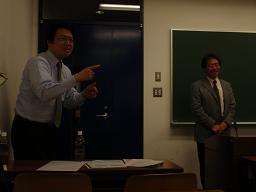
16:00-17:00 参加者による質疑応答(Free Discussion among Participants)
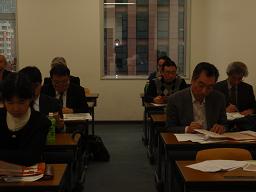
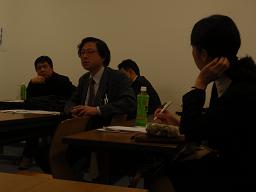
経済教育ワークショップ「東京」の要旨:
3月14日の午後、日大経済学部7号館において経済教育ワークショップ「東京」が、(財)経済広報センターと東京都千代田区教育委員会の後援で開催された。中学校の社会科教員を対象とするワークショップであったが、それ以外にも高校教員や大学教授、出版関係者、ビジネス関係者など多様な顔触れの参加者が20名ほど集まり、それぞれの立場から活発なコメントや意見の交換が行われた。
まず新井明氏(都立西高)の開会の辞に続いて、篠原総一(同志社大)経済教育ネットワーク代表が、「『仕組み』から学ぶ経済」というテーマで講演を行った。
篠原氏によると、経済の基本は分業と交換であり、その分業と交換の「仕組み」を知ることが、経済を理解する上でもっとも重要であること。特に経済全体のあり方を、企業による生産の仕組みの視点からすべて関連付けることによって、雇用、労働、消費、金融、政府などの仕組みも容易に理解できるようになることが指摘された。
次に、三枝利多氏(目黒中央中)が、以上の指摘に基づいて、特に企業と経済社会全体とのつながりを考えるための教材の提案が行われた。
その展開1としては、まず教室で2時間程度の「牛丼屋経営シミュレーション」のゲームを行い、その結果を振り返る。その上で展開2として、「牛丼屋を大きくしてみよう」という新たなシミュレーションを行い、そこから現実の企業についての認識を深めさせ、企業と経済社会のかかわりを考えさせる。さらに時間があれば、企業づくりのシミュレーションを企業関係者を講師として招いて行う。そして最後に、企業と家計および政府とのつながりについてのシミュレーションもできれば望ましい。
以上の篠原、三枝両氏のプレゼンに関する討論が、加藤一誠氏(日大)の司会で1時間ほど行われたが、議論は多岐にわたり、篠原氏については、そもそも経済を見る見方としての「効率」と「公正」という視点を生産や消費のレベルでどう生かすか、例えば企業がモノを作る仕組みを評価する視点として、生産の効率性だけでなく、社会全体で不必要なものを作りすぎていないかといった点も重要であることが指摘され、さまざまな意見が出された。
また三枝氏については、牛丼屋のモデルは中学生だけでなく高校レベルでも非常に役立つ教材であることが指摘される一方で、簡単なモデルではカバーできない重要な点、例えば雇用の問題などを、限られた時間内でどうカバーするのかが課題といった議論が出された。
さらに、企業関係者からは最近の経済の混迷に鑑みて、伝統的な経済学の考え方だけでなく、新しい社会のあり方や価値観に基づいた経済の教育を考えるべきではないかといった根本的な問題も提起され、議論はワークショップ後の懇親会に持ち越された。
全体として、短い時間の中で消化するには大きすぎるテーマであったが、その意図と意味および課題が参加全員で共有でき、今後に向けて有意義な一歩が踏み出されたワークショップであった。
(文責・宮尾)
Summary of Economic Education Workshop@Tokyo:
A one-day workshop on economic education mainly for middle school teachers, organized by Network for Economic Education and sponsored by Keizai Kiho Center and Chiyoda-ku Kyoiku Iinkai, was held at Nihon University in Tokyo on March 14, 2009. There were about 20 participants, including not only middle school but also high school teachers, university professors, publishers, businesspersons, etc.
After an opening address by Mr. Akira Arai (Tokyo Nishi High), Mr. Shoichi Shinohara (Doshisha Univ.) gave a keynote lecture on "Understanding Economic Mechanism, " where he emphasized "division of labor" and "exchange" as the basics of the economy, and the importance of the "firm" to understand the mechanism of production and its relation with the rest of the economy including employement, labor, consumption, finance and government.
Next, Mr. Toshita Saegusa (Meguro Chuo Middle School) presented a teching material to help understnd the relationship between the firm and the economy as a whole, based on Mr. Shinohara's argument.
Mr. Saegusa suggested that after a two-hour exercise of the "Beef Rice Bowl Simulation" is conducted and reviewed, a new simulation "How to Expand Beef Rice Bowl Shop" should be tried to help pupils understand the mechanism of the firm further and its relations with the economy and society at large. If time permits, the next step might be to simulate "New Business Start-up" with the help of outside guests from the business world. Finally, a simulation exercise regarding the relationship between the firm and consumer/government would be desirable, if possible.
A free discussion among the participants on the above presentations was conducted by moderater, Mr. Issei Kato (Nihon Univ.) for about an hour. There were various comments and arguments, including the basic viewpoint such as "efficiency" and "equity" to evaluate the mechanism of the firm as well as the economy as a whole, in relation with Mr. Shinohara's presentation, and the limitations and possible modifications of the simple "Beef Rice Bowl Simulation" such as the employment factor, in relation with Mr. Saegusa's presentation.
Toward the end, a participant from the business world raised a fundamental question about the traditional economic approach that was emphasized at this workshop, and suggested that a brand new approach should be considered to address the issues of the current financial crisis and basic value changes in the global economy. As a result, the discussion was carried over to the networking party after the workship.
Overall, the main theme might have been a little too much to deal with at a one-day (one-afternoon) workship, but all the participants could clearly understand the purpose, meanings and remaining problems with this important theme. In this sense, the workshop was a success as a first step toward further activities along this line in the future.
(written by T. Miyao)
日時:2009年3月14日 13:00-17:00:Date: March 14, 2009
場所:日大経済学部:Place: Nihon University, Economics Department
参加者:中学校社会科教員を中心に約20名(含発表者)
Participants: About 20 middle school teachers & specialists
後援:(財)経済広報センター、東京都千代田区教育委員会
Sponsors: Keizai Koho Center, Chiyoda-ku Kyoiku Iinkai
プログラム: Program:
13:05-13:10 挨拶:新井明氏(Opening Address by Mr. A. Arai):写真左
13:10-14:20 講演:篠原総一氏(Main Lecture by Mr. S. Shinohara):写真右


14:30-15:40 教材提案:三枝利多氏(Proposal by Mr. T. Saegusa):写真左
司会とコメント役の加藤一誠氏(Moderator & Discussant, Mr. I. Kato):写真右


16:00-17:00 参加者による質疑応答(Free Discussion among Participants)


経済教育ワークショップ「東京」の要旨:
3月14日の午後、日大経済学部7号館において経済教育ワークショップ「東京」が、(財)経済広報センターと東京都千代田区教育委員会の後援で開催された。中学校の社会科教員を対象とするワークショップであったが、それ以外にも高校教員や大学教授、出版関係者、ビジネス関係者など多様な顔触れの参加者が20名ほど集まり、それぞれの立場から活発なコメントや意見の交換が行われた。
まず新井明氏(都立西高)の開会の辞に続いて、篠原総一(同志社大)経済教育ネットワーク代表が、「『仕組み』から学ぶ経済」というテーマで講演を行った。
篠原氏によると、経済の基本は分業と交換であり、その分業と交換の「仕組み」を知ることが、経済を理解する上でもっとも重要であること。特に経済全体のあり方を、企業による生産の仕組みの視点からすべて関連付けることによって、雇用、労働、消費、金融、政府などの仕組みも容易に理解できるようになることが指摘された。
次に、三枝利多氏(目黒中央中)が、以上の指摘に基づいて、特に企業と経済社会全体とのつながりを考えるための教材の提案が行われた。
その展開1としては、まず教室で2時間程度の「牛丼屋経営シミュレーション」のゲームを行い、その結果を振り返る。その上で展開2として、「牛丼屋を大きくしてみよう」という新たなシミュレーションを行い、そこから現実の企業についての認識を深めさせ、企業と経済社会のかかわりを考えさせる。さらに時間があれば、企業づくりのシミュレーションを企業関係者を講師として招いて行う。そして最後に、企業と家計および政府とのつながりについてのシミュレーションもできれば望ましい。
以上の篠原、三枝両氏のプレゼンに関する討論が、加藤一誠氏(日大)の司会で1時間ほど行われたが、議論は多岐にわたり、篠原氏については、そもそも経済を見る見方としての「効率」と「公正」という視点を生産や消費のレベルでどう生かすか、例えば企業がモノを作る仕組みを評価する視点として、生産の効率性だけでなく、社会全体で不必要なものを作りすぎていないかといった点も重要であることが指摘され、さまざまな意見が出された。
また三枝氏については、牛丼屋のモデルは中学生だけでなく高校レベルでも非常に役立つ教材であることが指摘される一方で、簡単なモデルではカバーできない重要な点、例えば雇用の問題などを、限られた時間内でどうカバーするのかが課題といった議論が出された。
さらに、企業関係者からは最近の経済の混迷に鑑みて、伝統的な経済学の考え方だけでなく、新しい社会のあり方や価値観に基づいた経済の教育を考えるべきではないかといった根本的な問題も提起され、議論はワークショップ後の懇親会に持ち越された。
全体として、短い時間の中で消化するには大きすぎるテーマであったが、その意図と意味および課題が参加全員で共有でき、今後に向けて有意義な一歩が踏み出されたワークショップであった。
(文責・宮尾)
Summary of Economic Education Workshop@Tokyo:
A one-day workshop on economic education mainly for middle school teachers, organized by Network for Economic Education and sponsored by Keizai Kiho Center and Chiyoda-ku Kyoiku Iinkai, was held at Nihon University in Tokyo on March 14, 2009. There were about 20 participants, including not only middle school but also high school teachers, university professors, publishers, businesspersons, etc.
After an opening address by Mr. Akira Arai (Tokyo Nishi High), Mr. Shoichi Shinohara (Doshisha Univ.) gave a keynote lecture on "Understanding Economic Mechanism, " where he emphasized "division of labor" and "exchange" as the basics of the economy, and the importance of the "firm" to understand the mechanism of production and its relation with the rest of the economy including employement, labor, consumption, finance and government.
Next, Mr. Toshita Saegusa (Meguro Chuo Middle School) presented a teching material to help understnd the relationship between the firm and the economy as a whole, based on Mr. Shinohara's argument.
Mr. Saegusa suggested that after a two-hour exercise of the "Beef Rice Bowl Simulation" is conducted and reviewed, a new simulation "How to Expand Beef Rice Bowl Shop" should be tried to help pupils understand the mechanism of the firm further and its relations with the economy and society at large. If time permits, the next step might be to simulate "New Business Start-up" with the help of outside guests from the business world. Finally, a simulation exercise regarding the relationship between the firm and consumer/government would be desirable, if possible.
A free discussion among the participants on the above presentations was conducted by moderater, Mr. Issei Kato (Nihon Univ.) for about an hour. There were various comments and arguments, including the basic viewpoint such as "efficiency" and "equity" to evaluate the mechanism of the firm as well as the economy as a whole, in relation with Mr. Shinohara's presentation, and the limitations and possible modifications of the simple "Beef Rice Bowl Simulation" such as the employment factor, in relation with Mr. Saegusa's presentation.
Toward the end, a participant from the business world raised a fundamental question about the traditional economic approach that was emphasized at this workshop, and suggested that a brand new approach should be considered to address the issues of the current financial crisis and basic value changes in the global economy. As a result, the discussion was carried over to the networking party after the workship.
Overall, the main theme might have been a little too much to deal with at a one-day (one-afternoon) workship, but all the participants could clearly understand the purpose, meanings and remaining problems with this important theme. In this sense, the workshop was a success as a first step toward further activities along this line in the future.
(written by T. Miyao)



